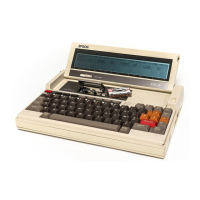REV.-A
2.5.2.5
SWS
SW5
is
the
Initial Reset
switch
which
is used
to
initialize
the
entire
computer
including
the
sub-
CPU
7508.
Normally,
it
is pressed
when
the
system
is
first
initialized and a message,
"SYSTEM
INITIALIZE", is displayed on
the
LCD panel.
This
switch
must
also be pressed,
however,
when
the
computer
gets
into
a
software
loop
or
the
sub-CPU
stops
operating
for
the
same
some
reason
and,
SW2
is ineffective.
The
switch
is an alternate singal-pole,
double-throw
type
(containing
contacts
A and
B).
One
con-
tact
is
connected
to
the
reset
(RS)
input
terminal
of
the
sub-CPU
for
initializing
it. The
other
one
(A4/5
in
the
circuit
diagram) is inserted
between
the
backup line
power
line
from
the
auxiliary
bat-
tery
and
the
logic
circuit
voltage
supply
line.
When
the
switch
is pressed and
this
contact
is
closed,
the
backup voltage,
which
is
normally
supplied
through
the
transistor
Q23,
is
directly
fed
to
the
logic
circuit
voltage
supply
line, bypassing
the
transistor.
This
is required
to
slightly
raise
the logic
circuit
supply
voltage
in
order
to
ensure
computer
reinitialization in an
abnormal
condi-
tion. A
hardware
failure
may
have occurred
if
SW5
needs
to
be pressed.
2.5.3
Variable
Resistors
Three variable resistors are located on
the
MAPLE board as
shown
in Fig. 2-61 and one each
on
the
LCD
unit
(MAP-LD
board) and
the
microcassette
tape drive
(MAP-MC
board),
totalling
five.
The
functions
of
the
individual variable resistors are detailed in
the
following.
2.5.3.1
MAPLE
Board
Variable
Resistors
Table
2-12
lists
the
three variable resistors used on
the
MAPLE board
together
with
their
func-
tions.
Table
2-12
MAPLE
Board
Variable
Resistors
and
Their
Functions
Name
Function
VR1
This variable resistor is used
to
control
the
output
(Circuit
diagram
coordination
H7)
sound level
to
the
built-in
and external (if used)
speakers.
VR2
Allows
the
user
to
adjust
the
reference
voltage
to
the
((Circuit diagram
coordination
D5)
A-D
converter
(1
D).
An
incorrect
adjustment
of
this
re-
ference
voltage
may
result in
an
error in
voltage
detec-
tion
and
A-D
conversion
of
the
barcode reader
or
ex-
ternal analog
input
signal
by
the
sub-CPU.
VR3
Allows
the
user
to
adjust
the
frequency
of
the
sub-CPU
(Circuit diagram
coordination
C6!7)
driving
clock
signal.
2-61

